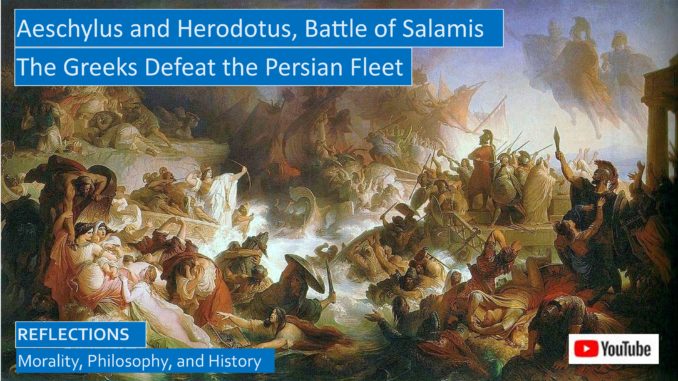
We pondered in our first video and blog how, just as in the Iliad, the Greek soldiers and sailors in the Histories of Herodotus fight for cleos, or glory, and warriors in these warrior societies are immortalized by their great and marvelous deeds on the battlefield. Herodotus is interested in recording any mighty deeds of both the Greeks and the Persians, although the glory was earned mostly by the Greeks.
The first video had background information plus the opening chapters covering the ethnography and the Persian conquests of Egypt, Ionia, and Scythia:
YouTube video: https://youtu.be/YwUojwMIQEw
In our second video Herodotus recounts the history of the Greco-Persian wars themselves:
http://www.seekingvirtueandwisdom.com/histories-of-herodotus-the-greco-persian-wars/
YouTube video: https://youtu.be/JjNcyLo54ko
The above videos have more extensive introductory information, let us simply summarize the ancient ships of war. In the Greek navy, the triremes had three long stacked rows of rowers who had to row in unison, with a heavy ram below the waterline at the front of the ship. A typical trireme had about 170 rowers, plus a handful of hoplite infantry ready on deck. The favored strategy was to ram the middle of the opposing ship, sinking it.[1] Greek navies fighting on both sides rowed triremes, several references in Herodotus state that it was difficult to tell them apart in the thick of battle.
Please view the YouTube video for this blog: https://youtu.be/cabAkQwHnlk
YouTube script with more book links: https://www.slideshare.net/BruceStrom1/the-greeks-triumph-in-the-battle-of-salamis-aeschylus-and-herodotus-the-grecopersian-wars
Herodotus is best when he repeats anecdotes or interesting stories, but his descriptions of the important battles sometimes fall short, but the Greek playwright Aeschylus fought in the Greco-Persian Wars, and in his play, The Persians, he includes an emotional memory of the naval Battle of Salamis, where the outnumbered Greek fleet sinks a large portion of the mighty Persian fleet. Plus, we will tell other interesting vignettes from this battle that we could not fit in our other video.
One of the Persian commanders Xerxes admired was the Greek Artemisia, the only woman commander on either side of the war. Artemisia’s husband was the tyrant of the Persian satrapy of Caria, and when he died, she became the ruling tyrant, so she was commanding a trireme from Caria. Her son could have commanded the trireme, but she instead sailed with the fleet, “her own spirit of adventure and manly courage were her only incentives.”[2] This tyrantess Artemisia will figure prominently in the Battle of Salamis.
King Xerxes had an enormous army marching along the coast from Persia, Herodotus says there were over two million soldiers marching, but modern scholars accused Herodotus of exaggerating the size of the army, it would have been difficult in the ancient world to feed an army of one or two hundred thousand on the march. The vast Persian fleet sailed along the coast as the army marched.
THE SPARTAN FEW BLOCK THE PERSIAN ARMY AT THERMOPALYE
As we learned in our video on the Greco-Persian War, the Greek strategy was for the Spartan and Greek hoplites to stop the Persian army north of Athens at the Pass of Thermopylae, and for Athenian and Greek triremes to stop the Persian navy at the Straits of Salamis. The force of several thousand hoplites stopped the Persian army dead in its tracks when defending the narrow Pass at Thermopylae for many days, causing massive Persian casualties, but when a traitor revealed a mountain pass that avoided the pass, the Persians were able to attack from both sides. The Spartan commander knew they were doomed, he sent most of the confederate troops home, leaving a mostly Spartan force of the famous Three Hundred behind, who fought to the death. The movie 300, by the way, has many historical inaccuracies.
The decision was made to abandon Athens, as the Athenians could not prevent the city from falling under a Persian siege. The Athenian men would board their triremes while the women, children, and slaves would be sent as temporary refugees to the nearby Peloponnese city-state of Troezen, and also to Salamis, taking whatever property with them that they could, leaving Athens nearly deserted. One detail told by Plutarch that Herodotus did not mention was that helpless older citizens and domestic animals and pets had to be left behind.
The Persians lost no time in invading Attica and the nearly empty city of Athens, laying a siege on the wooden walls built on the Acropolis, quickly overwhelming those Athenians trusting in these walls, looting and burning Athens and all her temples.[3] But booty of another kind was not to be found, no concubines could be seized.
Should the Persians attack the Athenian fleet at Salamis? Artemisia alone among the Persians disagreed with the general Mardonius, counseling that the Persians should not rush to attack the Greek fleet at Salamis: “The Greeks are as far superior to your men in naval matters as men are to women. In any case, what pressing need have you to risk further action at sea? Have you not taken Athens, the main objective of the war? Is not the rest of Greece in your power?” “If you merely keep your fleet where it is now, you can stay here or advance into the Peloponnese, you will easily accomplish your purpose.”[4]
THE GREEK TRIREMES RAM AND SINK THE PERSIAN FLEET AT SALAMIS
Once the tides of war shifted to the Greeks the Spartan’s noble stand at Thermopylae, like the Alamo, would inspire them in their battles with the Persians, and would inspire historians over the centuries and the millennia, but the effect on the Greeks the day after the battle was despairing. Some were wanting to sail their triremes to the Isthmus to defend the Spartan lands of the Peloponnese.
Themistocles grasped that the best chance for the Greeks to prevail would be to fight in the cramped straits of Salamis. He addressed the Greek sailors and troops, “It is now in your power to save Greece, if you take my advice and engage the enemy’s fleets here in Salamis.” He details his plan: “First, we shall be fighting in narrow waters, and there, with our inferior numbers, we shall win.” “Fighting in a confined space favors us but the open sea favors the enemy. Second, Salamis, where we have put our women and children, will be preserved; and thirdly, you will be fighting in defense of the Peloponnese by remaining here just as much as withdrawing to the Isthmus.”[5]
Themistocles wanted to be sure that the Greeks would face the Persians in the cramped straits of Salamis, so he sent his slave Sicinnus to furtively visit the Persian camp to give a message to the commander so they would that night bottle up the Greek fleet in Salamis so they could not escape. Herodotus repeats this message for us, “I am the bearer of a secret communication from the Athenian commander, who is a well-wisher to your king and hopes for a Persian victory. He has told me to report to you that the Greeks are afraid and are planning to slip away. Only prevent them from slipping through your fingers, and you have at this moment an opportunity of unparalleled success.”[6]
The Persians were known for hiring their former Greek enemies as advisors, so Themistocles was assuring personal success no matter who won the Battle of Salamis. Indeed, later in life after the Athenians sent him into exile, Themistocles ruled a Greek city in Persia as a benign tyrant for many years.
In the play of Aeschylus, a messenger is giving Queen Atossa, widow of Darius, mother of Xerxes, an emotional eyewitness account of the naval Battle of Salamis:
“Our crews then, with no lack of order but with an obedient spirit, prepared their evening meal,
while each sailor looped his oar about its thole-pin so that it fitted well.
But when the light of the sun had faded and night drew on,
each master of an oar and each man versed in arms went on board.
The long Persian galleys cheered each other, line by line;
and they held their course as each captain had been ordered,
and all through the night the commanders of the fleet
kept their whole force cruising to and fro across the strait. Night began to wane,
yet the fleet of the Hellenes in no way attempted to put forth by stealth.”
We witness the brilliant tactics of Themistocles, for the Greek naval forces had the benefit of a sound night’s sleep and a good breakfast, while the Persians spent their night before the big battle bobbing up and down on the waves bottling up the Greeks, and not getting a wink of sleep. Can you imagine pulling an all-nighter, then having to row and fight all day long with little to eat and drink under the bright hot sun? With horror the dog-tired Persians greet the dawn and the battle cries of the Greeks:
“When, however, radiant Day with her white horses shone over all the land,
a loud cheer like a song of triumph first rang out from the Hellenes,
and, at the same instant, clear from the island crags,
an echo returned an answering cry.
Terror fell on all the barbarians, balked of their purpose;
for then the Hellenes chanted their solemn paean, not as in flight,
but as men rushing to the onset with the courage of gallant hearts.
The trumpet with its blast set all their side afire,
and instantly, at the word of command,
with the even stroke of foaming oars they struck the briny deep.
Swiftly they all came clear into view.
Their right wing, well marshaled, led on in orderly advance,
next their whole army pressed on against us,
and at the same time a loud shout met our ears:
“On, you men of Hellas! Free your native land.
Free your children, your wives, the temples of your fathers’ gods,
and the tombs of your ancestors. Now you are fighting for all you have.”
Then from our side arose in response the mingled clamor of Persian speech,
and straightaway the ships dashed together their bronze prows.
It was a ship of Hellas that began the charge,
and chopped off in its entirety the curved stern of a Phoenician boat.
Each captain drove his ship straight against some other ship.
At first the stream of the Persian army held its own.
When the mass of our ships had been crowded in the narrows,
and none could render another aid,
and each crashed its bronze prow against each of its own line,
they splintered their whole bank of oars.
Then the Hellenic galleys, not heedless of their chance,
hemmed them in and battered them on every side.
The hulls of our vessels rolled over,
and the sea was hidden from our sight,
strewn as it was with wrecks and slaughtered men.
The shores and reefs were crowded with our dead,
and every ship that formed a part of the barbarian fleet
plied its oars in disorderly flight.
But, as if our men were tuna or some haul of fish,
the foe kept striking and hacking them
with broken oars and fragments of wrecked ships.
Groans and shrieks together filled the open sea
until the face of black night hid the scene.
But as for the full extent of our disasters,
this, even if I had ten days in succession to do so,
I could not describe to you.
However, you can be sure that so great a multitude of men
never perished in a single day.”[7]
Herodotus tells us how Artemisia dealt with the excessive chaos in the battlefield: “After the Persian fleet had lost all semblance of order, Artemisia was chased by an Athenian trireme. As her ship happened to be closest to the enemy and there were other friendly ships just ahead of her, escape was impossible. In this awkward situation she hit on a plan which turned out greatly to her advantage: with the Athenian close on her tail, she drove ahead with all possible speed and rammed” a friendly ship, whether she had a quarrel with the captain of that ship or it was just in the way is hard to say, “but in any case she rammed and sank her, and was lucky enough to reap a double benefit. For the captain of the Athenian trireme, on seeing her ram an enemy, naturally assumed her ship was a Greek ship, or at least a deserter fighting on the Greek side; so he abandoned the chase and turned to attack elsewhere.” Xerxes was watching, and a bystander commented, “Do you see, my lord, how well Artemisia is fighting? She has sunk an enemy ship.” To which Xerxes responded, “My men have turned into women, and my women into men.” Artemisia was indeed lucky, “there were no survivors to accuse her.”[8]
King Xerxes was concerned that the Greek fleet would sail to the Hellespont and destroy his bridges, so he started making plans for his escape. His general Mardonius said they should blame those confederates who were manning the ships, the Egyptians, the Phoenicians, the Cyprians, the Cilicians, because the Persians were not involved in these losses.
Mardonius tells Xerxes, “If you have made up your mind not to stay here, then go home together with the greater part of the army and I will make it my duty, with 300,000 picked troops, to deliver Greece to you in chains.” This gave a way for Xerxes to return home without losing too much face.
Artemisia advised Xerxes to accept the plan proposed by Mardonius, “Who cares if Mardonius comes to grief? He is only your slave, and the Greeks will have but a poor triumph if they kill him. As for yourself, you will be going home with the object of your campaign established, for you have burnt Athens.”[9]
In Aeschylus’ play, The Persians, the ghost of Darius gives this instruction to the good Persian Queen Atossa:
“Wherefore instruct your lord, your son Xerxes,
With well-reasoned admonitions teach him,
To have a humbler heart and cast away,
The sin of pride, for it offends God.”[10]
Aeschylus imagines what Xerxes may have said when he arrived home at Persia:
“My fate is upon me,
My star has declined,
A grief has undone me,
A doom none divined.
Age, thine eyes chide me,
They bow down my head,
My strength is denied me,
My limbs are as lead.
Would Zeus I lay fallen in battle,
Covered up out of sight with the dead!”
That was the Britannica Great Books translation, this is Smyth’s 1922 translation:
“Alas, wretched am I who have met this cruel doom
which did not give the faintest sign of its coming!
In what savage mood has Fortune trampled upon the Persian race?
What misery is yet in store for me, unhappy wretch?
The strength of my limbs is loosened
as I look upon this aged group of citizens.
Ah, Zeus, I wish that the doom of death had buried me, too,
together with the men who have been laid low!”[11]
[1] https://en.wikipedia.org/wiki/Trireme
[2] Herodotus, Histories, translated by Aubrey De Selincourt (London, New York: Penguin Classics, 2003, 1954, originally Fifth Century BC), Book VII, Chapters 99, p. 447.
[3] Herodotus, Histories, Book VIII, Chapters 49-52, pp. 516-517.
[4] Herodotus, Histories, Book VIII, Chapter 68, pp. 522-523.
[5] Herodotus, Histories, Book VIII, Chapters 57-59, pp. 518-519.
[6] Herodotus, Histories, Book VIII, Chapters 75-76, pp. 525-526.
[7] Aeschylus, The Persians, translation by Herbert Weir Smyth, 1922, http://www.perseus.tufts.edu/hopper/text?doc=Aesch.+Pers.+1&redirect=true , and also from The Great Books, lines 374-430, p. 19.
[8] Herodotus, Histories, Book VIII, Chapters 87-88, pp. 529-530.
[9] Herodotus, Histories, Book VIII, Chapters 97-102, pp. 533-538.
[10] Aeschylus, The Persians, from The Great Books, lines 833-836, p. 24.
[11] Aeschylus, The Persians, lines 909-915, p. 24.

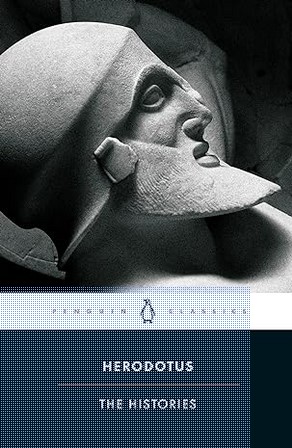


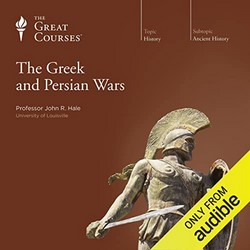
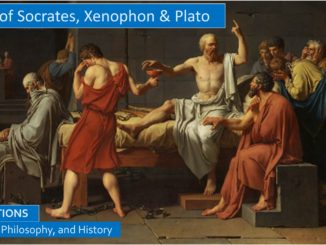
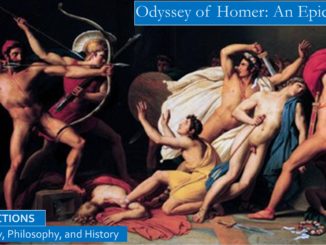

6 Trackbacks / Pingbacks